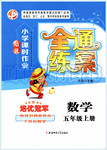题目内容
【题目】
A man named Jackson lived in the next house.
_____________________________________________
【答案】见解析
【解析】In the next house lived a man named Jackson.

练习册系列答案
 小学课时作业全通练案系列答案
小学课时作业全通练案系列答案
相关题目
题目内容
【题目】
A man named Jackson lived in the next house.
_____________________________________________
【答案】见解析
【解析】In the next house lived a man named Jackson.

 小学课时作业全通练案系列答案
小学课时作业全通练案系列答案